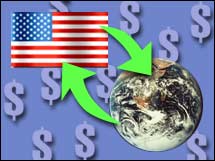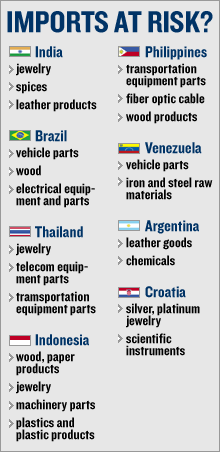|
Trade: The dangers of payback Experts warn that revoking trade benefits to India and others could hurt U.S. businesses and consumers. NEW YORK (CNNMoney.com) -- After it failed to convince India, Brazil and some other trade partners to give more market access to American products, the United States is thinking about revoking trade benefits to some of these countries. Quid pro quo?
Indeed, if that is the case, then some trade experts warn that the U.S. could potentially be "shooting itself in the foot" because ultimately it's U.S. businesses and American consumers who end up paying for this game of political arm-twisting. Earlier this month, the U.S. said it would review whether to limit, suspend or withdraw longstanding trade concessions for India, Brazil and 11 other developing countries. The announcement came less than a month after the collapse of the World Trade Organization's (WTO) Doha Round of trade talks between the United States and trade ministers from the European Union, Australia, Japan, India and Brazil. These countries have been trying to reach a worldwide deal on how to boost trade in farm and industrial goods. US Trade Representative (USTR) Susan Schwab said in a statement that the U.S. would reevaluate the Generalized System of Preferences (GSP) program - a policy that's been in place for more than 30 years - which allows lower duty imports for products from 13 "upper middle income economies." These include include India, Brazil, South Africa, Russia, Philippines, Romania, Argentina, Croatia, Indonesia, Kazakhstan, Thailand, Turkey and Venezuela. India and Brazil were also among the countries that butted heads with U.S. negotiators over further agricultural trade liberalization. They wanted more access to U.S. food markets but were unwilling, in the eyes of the American negotiators, to open up their markets to U.S. retail interests. The GSP program is set to expire at the end of the year unless it is reauthorized by Congress. "One of the concerns that Congress has raised is that GSP benefits go largely to a few countries, while many developing countries are not trading much under the program. We want to ensure that we are operating the program as Congress intended," Schwab said, adding that it would be the program's first review in twenty years. A spokeswoman for Senate Finance Committee chairman Sen. Chuck Grassley (Rep. Iowa) confirmed to CNNMoney.com that Grassley would like Schwab to remove India and Brazil as GSP beneficiaries. "Sen. Grassley feels that India and Brazil wanted the best of both worlds in Doha. They stalled the talks even though an agreement would have been good for world business," she said. Daniella Markheim, trade policy analyst with the conservative Heritage Foundation, said kicking out India and Brazil will ultimately harm U.S. businesses and consumers . "It doesn't help us to eliminate these benefits and raise tariffs on products that we import," Markheim said. "The USTR is of the mindset that free trade benefits us only when we're exporting to other countries and not through imports." "This is going to be a pretty expensive bargaining chip for the U.S., Markheim said. It'll be disruptive to U.S. businesses who'll have to find cheaper alternative sourcing for products like jewelry and textiles. "Many importers will shift their business to China. This makes no sense. U.S. is already complaining about a huge trade deficit with China and we're only facilitating more business there." For consumers, it could mean having to pay more for less selection of products, Markheim said. India potentially stands to take the biggest hit relative to other countries, said Viji Rangaswami, trade expert with the Carnegie Endowment for International Peace. This could create an awkwardness between the two countries at a time when the Bush administration has been working hard to foster warmer economic and political relations with India. Rangaswami estimates that 20 percent of India's exports to the United States currently qualify for the GSP benefits, including 46 percent of its jewelry exports. India is one of the larger users of GSP. Therefore, removing India will also hurt small and medium business operators there, she said. While the U.S.may be hoping to send a political message to India and others, Rangaswami said the agency is probably also hoping to placate Congress following the Doha failure. "My own view is that the USTR is conducting the review in an effort to appease Congress and head off any legislative action from the Hill in terms of dictating which country stays or goes from the GSP," Rangaswami said. "I think the USTR would like to retain its discretion in that matter. She speculates that the U.S. might find some middle ground and revoke the trade benefits on some imports from India and other countries rather than eliminating all benefits. "The USTR probably would like to renew the program. It's been successful in garnishing goodwill in trade negotiations," she added. The USTR could not immediately be reached for comment. The Indian and Brazilian embassies in Washington did not immediately return calls for comment. |
|


